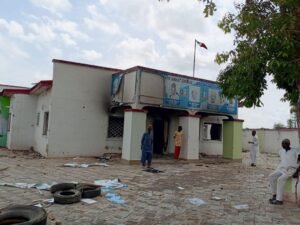The African continent has witnessed a surge in anti-government protests in recent years, characterized by mass mobilizations and emotional demands for change. Countries such as Kenya, Nigeria, Sudan, and South Africa have been at the forefront of these movements, each with its unique context yet sharing common underlying themes. The catalyst for these widespread protests often revolves around the pursuit of better governance, economic reforms, and the protection of human rights.
In Nigeria, the #EndSARS movement emerged as a pivotal example of youth-led protests against police brutality and misconduct. The movement gained international attention, exemplifying a broader dissatisfaction with systemic corruption and ineffective governance. Similarly, Sudan’s revolution in 2019, which led to the ousting of long-time ruler Omar al-Bashir, was driven by the populace’s exasperation with economic mismanagement and civil liberties suppression.
#EndBadGovernance Hunger Protests in Nigeria
The latest in Nigeria is the #EndBadGovernance Hunger Protests. Nigerians took to the streets in major cities across the country to protest economic hardship despite the government’s last-minute efforts to prevent the demonstration. Inflation has reached 34%, owing primarily to the twin policies of subsidy removal and naira floating. That has pushed the cost of basic items beyond the reach of millions of Nigerians.

Authorities nationwide rallied around to halt the protest in the wake of calls for it. They issued a warning that criminals might take them hostage. While they admitted to the nation’s challenges, they urged the organisers to shelve the protest and give the government more time to address the issues.
However, the protest held and discussions about it, tagged #EndBadGovernance protest, gained momentum on social media, leading to conversations among young Nigerians on digital platforms.
Kenyans Protest Over Tax Hike Proposals
Recently, Kenyans stagged a nationwide protest against government tax hike plans. Protesters in the capital city of Nairobi broke into the parliament building and set part of it on fire Tuesday, just after lawmakers voted to pass the controversial finance bill. The Kenya National Commission on Human Rights said at least 22 people were killed in the clashes, and other organizations cited similar death tolls.

The deeply unpopular tax increases were intended to raise almost $2.3 billion to help address Kenya’s dire finances. The national debt has spiralled out of control for years, bringing pressure on the government from foreign financial institutions and forcing it to hand over a massive proportion of its annual revenue in interest payments.
A man died, 200 people were injured, and more than 100 people were arrested across Kenya in nationwide protests against government tax hike plans, rights groups have said.
South Africa’s student-led #FeesMustFall protests
South Africa’s student-led #FeesMustFall protests focused on issues of educational equity and financial accessibility, highlighting the broader economic inequalities that persist within the nation. These protests reflect a growing awareness and intolerance of systemic failings and a collective yearning for a government that is responsive and accountable to its citizens.
Additionally, these movements frequently fuel a well-connected and tech-savvy youth population using social media to organize, mobilize, and amplify their global demands. As a result, the protests have garnered widespread media coverage and international solidarity, putting pressure on governments to address the grievances.
As we delve deeper into the causes, impacts, and future implications of these anti-government protests, it becomes evident that they are symptomatic of broader structural issues and the aspirations of a populace hungry for transformational change. This blog post aims to unpack these dimensions, comprehensively analysing one of the most defining trends in contemporary African sociopolitical landscapes.
Causes of the Unrest
The surge in anti-government protests across Africa can be attributed to economic, political, and social factors that have collectively driven citizens to the streets. One of the primary economic challenges is the persistently high unemployment rate, particularly among the youth, which has led to widespread disenchantment and frustration. With limited job opportunities, young people cannot achieve economic stability, exacerbating feelings of marginalization and hopelessness.
In addition to unemployment, inflation and poor living conditions are significant catalysts for public unrest. Rising prices of basic commodities and essential services strain household budgets, rendering daily survival arduous for many. Inadequate social services, such as those for housing, healthcare, and education, frequently make these economic hardships worse. As a result, the populace perceives a stark dichotomy between their needs and the government’s ability to address them effectively.
Political factors also play a crucial role in fueling anti-government protests. Corruption within governmental institutions remains endemic in many African countries, leading to a pervasive lack of trust in public officials. When political leaders engage in corrupt practices, siphon public funds for personal gain, or manipulate election outcomes, citizens’ faith in democratic processes erodes. This lack of transparency and accountability creates a ripe environment for uprisings, as individuals feel compelled to demand political reforms and justice through mass mobilization.
Systemic inequality further deepens public dissatisfaction. Disparities in income distribution, access to resources, and social mobility contribute to a sense of injustice among marginalized communities. These inequities are often visible along ethnic, regional, or socio-economic lines, exacerbating tensions and fostering a collective call for equitable governance.
Social media and digital platforms have also been significant in organizing and amplifying these protests. In an era of rapid and widespread information dissemination, social media facilitates the mobilization of protestors and the dissemination of grievances. Platforms such as Twitter, Facebook, and WhatsApp enable activists to coordinate actions, share real-time updates, and attract international attention to their causes. The digital landscape thus serves as both a catalyst and a tool for sustained activism against perceived governmental failures.
Impacts on Society and Governance
Anti-government protests across Africa have significantly impacted society and governance, producing a complex landscape of consequences. Politically, these movements have often resulted in a state of flux. One of the most prominent outcomes is the heightened political awareness and citizen engagement. Increased participation in democratic processes has been evident in numerous countries, leading to a surge in voter turnout and more active civil society organizations. Moreover, these protests have prompted policy revisions as governments strive to address the grievances of their populace. Reforms in sectors like education, healthcare, and employment often emerge as direct responses to the public’s demands.
Following the Kenya protest, President William Ruto called for “a conversation as a nation, as to how we manage the affairs of the nation together, the debt, the budget, together.” He also scrapped the office of the first lady and vowed to control luxurious lifestyles among Kenya Kwanza leaders
Nonetheless, the social fabric of nations experiencing such upheavals can become strained. Protests can cause significant disruptions to daily life, affecting businesses, schools, and public services. Economically, the instability can deter investments and tourism, exacerbating the challenges already fragile economies face. A case in point is Sudan, where the 2019 protests culminated in the ousting of long-term ruler Omar al-Bashir. While this marked a victory for democratic aspirations, the transitional period has been fraught with economic hardships and sporadic violence, demonstrating the dual-edged nature of these movements.
On the governance front, the responses to protests vary widely. Some regimes have resorted to oppressive measures, such as arbitrary detentions, censorship, and violent crackdowns, to quell dissent. This approach was notably seen in Zimbabwe during the 2019 protests over economic mismanagement. Conversely, other governments have adopted a more conciliatory approach, engaging in dialogue and attempting to implement reforms. Following widespread protests, Ethiopia’s government under Prime Minister Abiy Ahmed started making significant political changes, though it is still unclear how stable these changes will be in the long run.
Violence and repression are not uncommon, and such instances can deepen societal divisions and perpetuate cycles of unrest. Incidents like the End SARS protests in Nigeria have spotlighted issues of police brutality, prompting international attention and advocacy. However, they also highlight the potential for escalated violence and a heavy-handed governmental response. Therefore, while these protests play a vital role in shaping governance and societal norms, they also underscore the ongoing challenges of achieving sustainable peace and equitable development in African nations.
Future Implications and Potential Outcomes
The trajectory of anti-government protests in Africa presents a complex and multifaceted landscape with potential outcomes that span a broad spectrum. On one end, there is hope for sustained reforms and improved governance, where persistent civic activism pressures leaders to adopt transparency, accountability, and democratization. This optimistic scenario could lead to a more robust civil society where the rule of law is respected, human rights are upheld, and socioeconomic conditions are progressively improved.
Conversely, the pessimistic outlook envisages increased governmental crackdowns and political instability. In some African nations, regimes may resort to heightened repression to maintain power, including the use of force against protesters, censorship of media, and the stifling of political opposition. Such measures could exacerbate societal tensions and potentially lead to prolonged conflicts, humanitarian crises, and further destabilization of the region.
International organizations and foreign governments play a pivotal role in shaping these outcomes. Through diplomatic pressure, economic sanctions, and support for civil society initiatives, the international community can influence governments toward enacting reforms. Conversely, foreign governments may also engage in self-serving policies that either support authoritarian regimes or exacerbate regional conflicts by supplying arms or backing insurgent groups.
Several factors are essential for establishing long-term peace and stability in Africa. Strengthening institutions that promote good governance, investing in educational and economic opportunities for the youth, and fostering inclusive political dialogue can create an environment conducive to stability. Moreover, international actors must prioritize sustainable development and conflict resolution, ensuring their involvement yields positive and equitable outcomes for all segments of society.
Ultimately, the future of African anti-government protests hinges on a delicate balance of internal and external factors. While the road to enduring peace and prosperous governance is fraught with challenges, the collective efforts of Africa’s citizens, governments, and international partners could pave the way for a more promising future.










